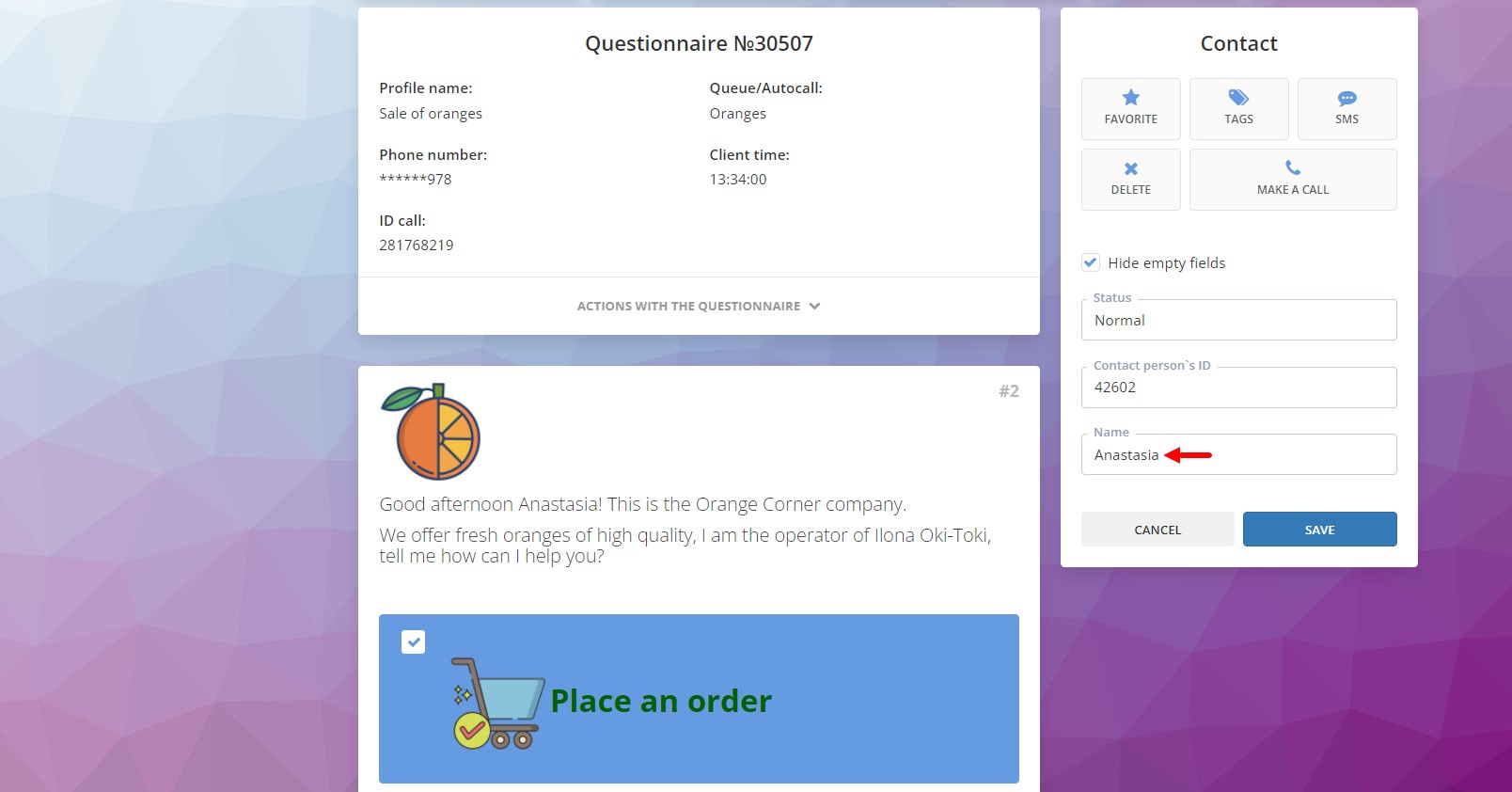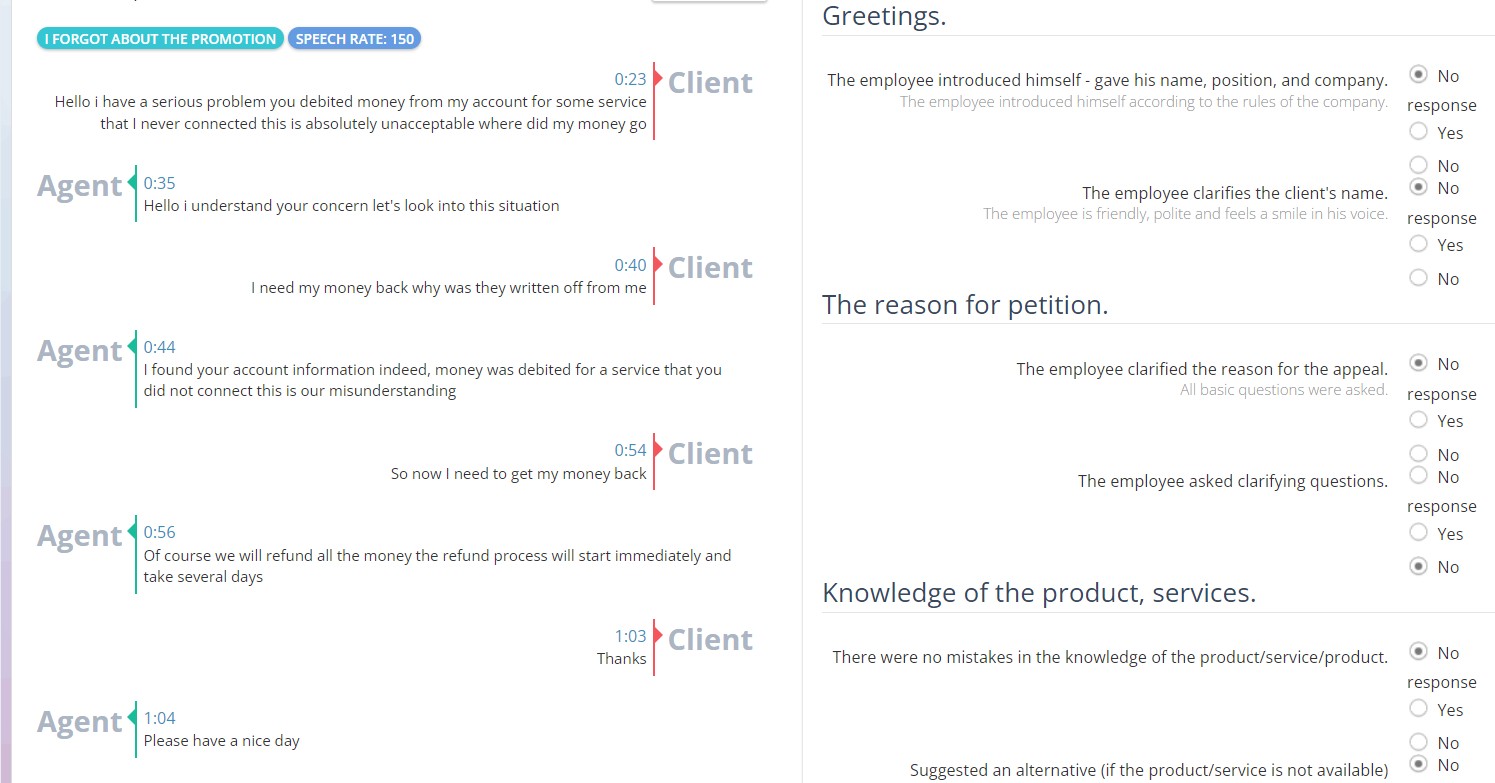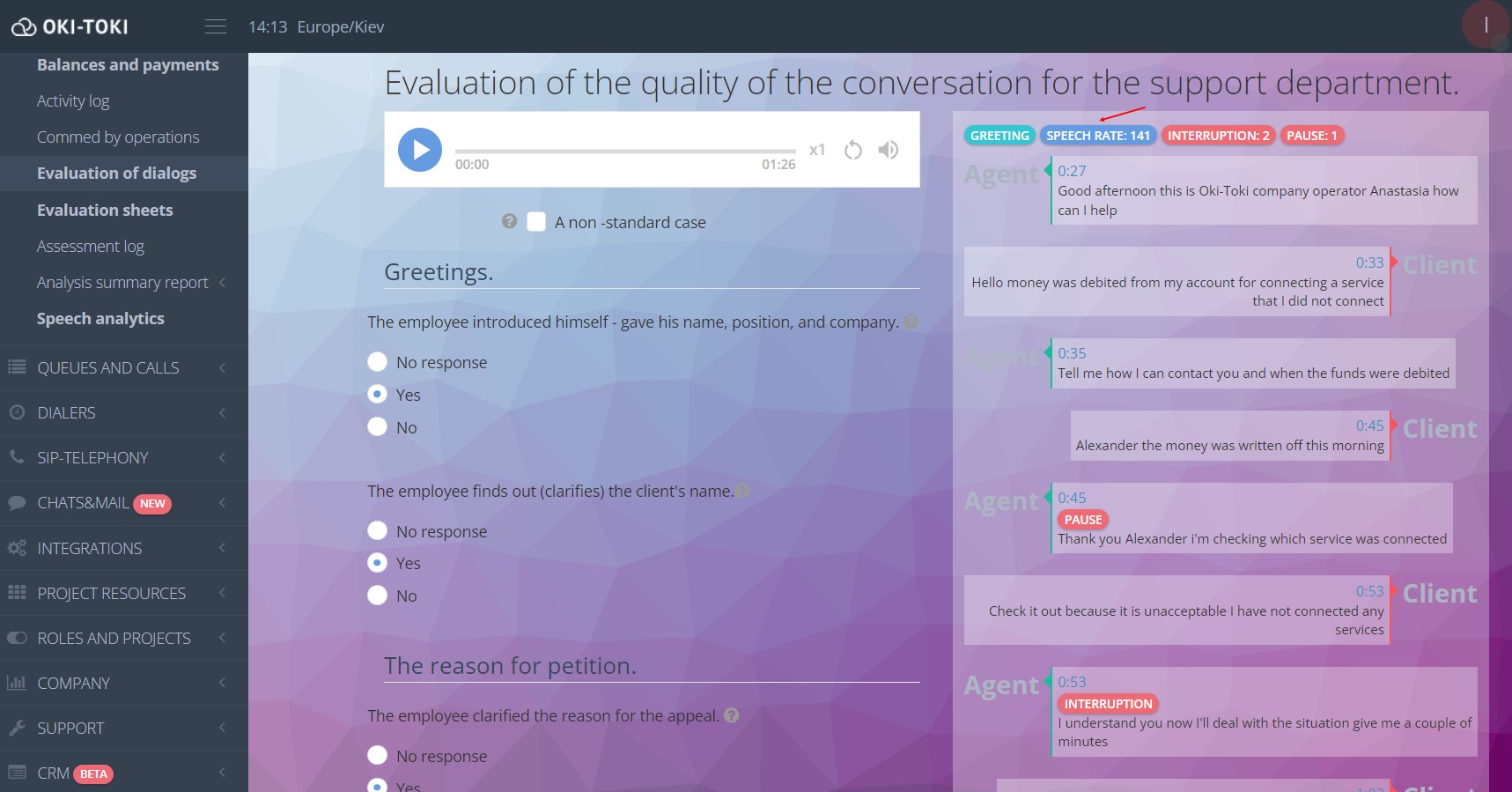Earning a customer’s trust is a key task for every call center agent.
We have prepared several valuable tips that are useful for both new agents and experienced employees looking to improve their customer communication skills.
1. Start by learning the customer’s name
Getting the necessary information from the customer becomes easier when you know their name. This makes the customer feel like an individual, and the consultants feel like they are talking to a real person, not just a customer profile.
Furthermore, correct pronunciation of the customer’s name is an expression of care and respect, which contributes to building more trusting relationships. If the customer has an unusual name, listen carefully when the customer pronounces it, instead of relying on data from the CRM system. This approach will help to avoid misunderstandings and create a positive impression.

2. Speak with a smile
It’s proven that a smile releases endorphins in the brain, thus improving the mood of the person who is smiling. In many contact centers, agents are encouraged to ‘always start a conversation with a smile’ to aid in building mutual understanding, as customers can detect this through their voices.
A smile adds warmth to the voice, which the customer or potential client can hear, significantly reducing the likelihood of the customer being rude to the agent. Furthermore, if the consultant’s mood improves, they are more likely to engage in the process of building mutual understanding.
It is important for agents to speak politely and professionally. The voice conveys emotions and moods, so using the right tone helps customers better perceive the information and creates a positive impression. Even if a customer is dissatisfied or irritated, agents should maintain a calm and friendly tone. This helps establish trustful relationships and enhances service in the call center.
3. Look at the problem from the customer’s perspective
Showing empathy is often the key to building mutual understanding, as it helps to establish trust and empathy while allowing consultants to demonstrate to customers that they are a priority.
“To find solutions, you need to understand the problem as if it were happening to you personally”.
Some agents may find it more challenging than others, and they can be advised to put themselves in the customer’s shoes. Alternatively, if agents find it genuinely difficult to express empathy, encourage them to imagine the customer as a close friend or family member.
4. Allow angry customers to “vent”
Establishing understanding with angry customers can be the most challenging, but it’s possible if the consultant allows them to express their opinions.
Wait for the angry customer to finish speaking, and then show empathy to demonstrate that you are actively listening and understanding the situation. Attempts to interrupt the customer will only worsen the situation.
Additionally, if the consultant uses this time to find out what actions can help resolve the issue, it will be easier to offer a solution to the customer.
With Oki-Toki, using the dual-sided transcript, you can find out what the customer and the agent were saying without listening to the call. The entire conversation will be displayed in the report, which is convenient and saves time for supervisors or quality control teams when evaluating dialogues.

5. Agent as a psychologist
Interacting with customers requires a delicate balance between the agents communication style and behavior. It’s important to understand that customers contact the call center for various reasons, and successful service requires flexibility in adaptation.
Listen to the customer attentively.
When a customer has problems and sounds concerned, it’s important to show empathy and understanding. An agent who communicates with a smile and enthusiasm in such cases may cause customer dissatisfaction. Attention and sincere empathy can establish a connection with a distressed or upset customer.
“Give the customer the most valuable thing: your attention and sympathy. This will open the doors to genuine connection”.
Maintain enthusiasm if the customer is optimistic.
If the customer is in a good mood, the agent can support the positive attitude. This helps to create a positive impression and maintain a friendly atmosphere.
Understanding the customer’s emotional state is crucial in communication. It creates a more harmonious and trusting interaction, where the customer feels that their emotions and mood are correctly understood by the agent. After all, even a simple expression of sympathy can make the customer happier, help to feel your support.
6. Pause in communication
Sometimes, call center agents don’t know how to respond to a customer’s question. In this case, it’s important to remain calm and confident.
“Don’t panic if you don’t know the answer to the customer’s question. It’s better to admit it and try to help. The main thing is not to stay silent but to find a solution together with the customer”.
Instead of panicking, agents can acknowledge that they don’t have the necessary information and offer a solution to the customer. For example: “I’m sorry, I can’t answer your question right now, let me find out. Can I ask you to wait for a moment?”
Novices often encounter such situations, as they may not have ready answers to customer questions. Employees with moderate experience often keep lists of ready-made answers. Experienced professionals, on the other hand, typically memorize most of the answers to customer questions. Prepare a list of key phrases that consultants can refer back to, as saying nothing at all is the worst option.
When the agent remains silent, customers instantly sense the lack of confidence, and the dialogue may become ineffective. If the agent has a support team or colleagues who can help, it makes sense to reach out to them.
If the agent promised the customer to find an answer and get back to them, it’s important to keep that promise and provide the necessary information in a timely manner.
When the agent cannot find an answer or if the customer requires specialized assistance, they can redirect the customer to another specialist or supervisor.
7. Speech pace and agent leadership qualities
Leadership qualities of an agent, such as confidence, empathy, and persistence, can aid in communication. An agent demonstrating confidence can convince the customer of their competence, while empathy can help understand their needs and emotions. Persistence in conversation is helpful in resolving complex issues.
When it comes to the pace of communication, it’s important to consider that different customers may prefer different communication styles. Some people speak quickly and actively, while others prefer a more calm and slow communication style. The agent should be flexible and adapt to each customer’s style.
“Every client is unique, as are their communication preferences. Listen to their pace and communication style for effective dialogue”.
Speech pace is extremely useful when someone is in an overexcited state. The conversation should start at the tone of the customer. Begin by demonstrating persistence, confidence, and care in your speech and manner to match and reassure them.
As long as the customer feels you are engaged, they will follow you, then you can gradually start to slow down your speech to calm them down.
First and foremost, during the conversation, the agent needs to obtain key data to understand the essence of the problem. Let the customer speak out, and then you can direct the conversation in the right direction and ask them all the clarifying questions.

8. Customer care
To establish trusting relationships with customers, it is important to show that they are cared for as individuals. When an agent interacts with a customer, they can gently inquire about their life beyond the current situation.
For example, if a customer mentions that they were recently in the hospital, you can ask for clarification on how they are feeling and how their recovery is going. Or if you remember them talking about vacation plans, you can inquire about how the trip went.
Remember that such small gestures of attention can strengthen relationships with customers and make communication more enjoyable.
Additional
- Be respectful. Consultants should never talk down to a client, as this can undermine all efforts to establish rapport.
- Be flexible in formalities. An agent should address clients as they introduce themselves. If the contact field states the name as Stanislav but the client introduces themselves as Stas, the agent should address them the same way.
- Maintain focus. Consultants must be 100% focused on the client and not allow colleagues or other office (or home) distractions to interfere. If the client feels the agent is not giving them full attention, they will always sense it.
- Ask clarifying questions. This shows your client that you are actively listening and making an effort to understand them. It will encourage your client to talk more, giving you the opportunity to gather valuable information.
- End the call professionally. Before ending the conversation, ask the client if there is anything else you can do for them. This shows that your priority is to assist the client, not just to end the call.
- Don’t make customers wait. Be careful with putting people on hold or transferring calls. This can damage rapport, as waiting time always seems longer when the client is left in silence. It’s better to inform the client of what the agent is going to do and how long it will take.
- Let agents see customer feedback. Consultants can be provided with the results of customer surveys after the call so they can evaluate their work and possibly make adjustments to their communication style. This is a great way to build rapport as it bridges the gap between what the consultant was doing during the conversation and what the client was feeling about it.
- Beware of inappropriate jokes. Everyone should be careful with humor. Sometimes there is too high a risk that a joking comment will be misunderstood – just like sarcasm in emails.
- Take a deep breath after a tough call. If a consultant carries stress from dealing with an angry client to the next call, it can instantly spoil rapport. Deep breathing has a therapeutic effect, so perhaps teach consultants to try it if they feel it’s necessary to help reduce stress reactions. They should be taught to leave the last call behind and start fresh every time.
We hope these tips will help you build trusting relationships with the clients of your call center. Remember, customer trust is the foundation of successful business, and by paying attention to it, you create a favorable environment for the growth and prosperity of your company.



